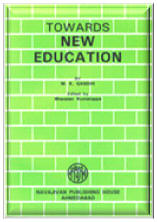
P.O. SEVAGRAM, DIST.WARDHA 442102, MS, INDIA. Phone: 91-7152-284753
FOUNDED BY MAHATMA GANDHI IN 1936
Towards New Education

TOWARDS NEW EDUCATION
Written by :M. K. Gandhi
Table of Contents
- PART I : INADEQUACY OF PREVAILING EDUCATION
- PART II : FORESHADOWING OF A NEW TYPE OF EDUCATION
- PART III : NEW EDUCATION
- PART IV : THE QUESTION OF RELIGIOUS EDUCATION
- PART V : THE LANGUAGE PROBLEM
- PART VI : COMPULSORY EDUCATION
- PART VII : EDUCATION OF SPECIAL GROUPS
- PART VIII : HIGHER EDUCATION
- Glossary
About This Book
Written by : M. K. Gandhi
Edited by : Bharatan Kumarappa
First Edition : October 1953
I.S.B.N : 81-7229-078-0
Printed and Published by : Jitendra T. Desai
Navajivan Mudranalaya,
Ahmedabad - 380 014,
India.
© Navajivan Trust, 1953
Download
PART IV : THE QUESTION OF RELIGIOUS EDUCATION
Religious Education
The question of religious education is very difficult, Yet we cannot do without it. India will never be godless. Rank atheism cannot flourish in this land. The task is indeed difficult. My head begins to turn as I think of religious education. Our religious teachers are hypocritical and selfish; they will have to be approached. The Mullas, the Dasturs and the Brahmins hold the key in their hands, but if they will not have the good sense, the energy that we have derived from English education will have to be devoted to religious education. This is not very difficult. Only the fringe of the ocean has been polluted, and it is those who are within the fringe who alone need cleansing. We who come under this category can even cleanse ourselves, because my remarks do not apply to the millions. In order to restore India to its pristine condition, we have to return to it.
Hind Swaraj (1908), p. 107
To me religion means Truth and Ahimsa or rather Truth alone, because Truth includes Ahimsa, Ahimsa being the necessary and indispensable means for its discovery. Therefore anything that promotes the practice of these virtues is a means for imparting religious education and the best way to do this, in my opinion, is for the teachers rigorously to practise these virtues in
their own person. Their very association with the boys, whether on the playground or in the class room, will then give the pupils a fine training in these fundamental virtues.
So much for instruction in the universal essentials of religion. A curriculum of religious instruction should include a study of the tenets of faiths other than one's own. For this purpose the students should be trained to cultivate the habit of understanding and appreciating the doctrines of various great religions of the world in a spirit of reverence and broad-minded tolerance. This if properly done would help to give them a spiritual assurance and a better appreciation of their own religion. There is one rule, however, which should always be kept in mind while studying all great religions, and that is that one should study them only through the writings of known votaries of the respective religions. For instance, if one wants to study the Bhagavata one should do so not through a translation of it made by a hostile critic but one prepared by a lover of the Bhagavata. Similarly to study the Bible one should study it through the commentaries of devoted Christians. This study of other religions besides one's own will give one a grasp of the rock-bottom unity of all religions and afford a glimpse also of that universal and absolute truth which lies beyond the 'dust of creeds and faiths'.
Let no one even for a moment entertain the fear that a reverent study of other religions is likely to weaken or shake one's faith in one's own. The Hindu system of philosophy regards all religions as containing the elements of truth in them and enjoins an attitude of respect and reverence towards them all. This of course pre-supposes regards for one's own religion. Study and appreciation of other religions need not cause a weakening of that regard ; it should mean extension of that regard to other religions.
In this respect religion stands on the same footing as culture. Just as preservation of one's own culture does not mean contempt for that of others, but requires assimilation of the best that there may be in all the other cultures, even so should be the case with religion.
Young India, 6-12-'28